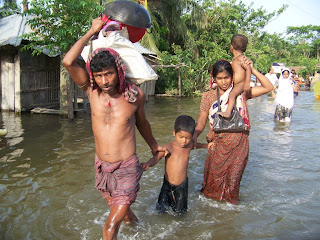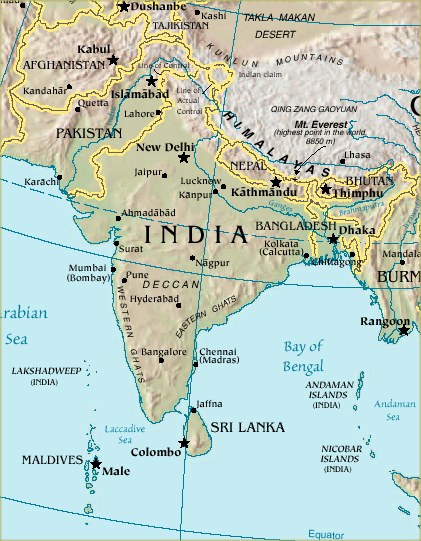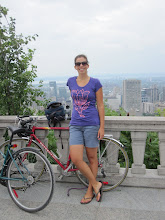 A neighbouring village coming out to see the foreigner!
A neighbouring village coming out to see the foreigner! It’s been some time since I last wrote. I’m afraid I will not be able to fully describe what I’ve been up to since then, but I can certainly attempt to share the greatest learning experiences, challenges and moments of happiness.
It’s been some time since I last wrote. I’m afraid I will not be able to fully describe what I’ve been up to since then, but I can certainly attempt to share the greatest learning experiences, challenges and moments of happiness.I returned to Dhaka Saturday, after spending almost two weeks in one of Nijera Kori’s working areas about 5 hours north of the capital. Up to that point my research had primarily involved speaking with NK’s central staff, academics, researchers and activists who are familiar with NK, and other NGOs with which NK collaborates. I felt I had a good sense of NK’s goals and activities, but less of a sense of their challenges. I was eager to hear from the landless group members, what they feel is most difficult about their civic participation and their membership with NK.

 I did 33 interviews, which is a lot of information to digest! The trip was a success in terms of meeting everyone I had planned to. The interviews mostly went well. I feel like I have the hang of it now. I think my biggest learning experience about interviewing in villages is that nothing is private! I always conducted the interviews in someone’s home (which is essentially a one room hut), although with the heat it was impossible to shut the door. Being inside was at least one small barrier between the other village members and us. It was not uncommon though for people to gradually creep towards the door during the interview, or for people to stick their heads through the windows to see what we were doing. Dipu, my translator, would shoo them away but I wondered how much they could hear from outside anyway.
I did 33 interviews, which is a lot of information to digest! The trip was a success in terms of meeting everyone I had planned to. The interviews mostly went well. I feel like I have the hang of it now. I think my biggest learning experience about interviewing in villages is that nothing is private! I always conducted the interviews in someone’s home (which is essentially a one room hut), although with the heat it was impossible to shut the door. Being inside was at least one small barrier between the other village members and us. It was not uncommon though for people to gradually creep towards the door during the interview, or for people to stick their heads through the windows to see what we were doing. Dipu, my translator, would shoo them away but I wondered how much they could hear from outside anyway. I was most surprised that this lack of privacy did not impede interviewees from sharing extremely personal information with me about their lives, their relationships with their husbands, wives and families, and about NK. But the reality is that village life naturally includes less privacy and anonymity than city living (the same is true in Canada). It seemed that the village members that I met accepted this fact (most probably had never known any other way of living) and so were willing to be very open in sharing their perspectives, their opinions and even their personal stories with me. I am left wondering though what the impact of ours conversations is on the members I interviewed and on the village dynamics. Will village members talk about what was discussed in the interviews amongst themselves? Will this be harmful in any way to the people who shared the most personal stories?
I was most surprised that this lack of privacy did not impede interviewees from sharing extremely personal information with me about their lives, their relationships with their husbands, wives and families, and about NK. But the reality is that village life naturally includes less privacy and anonymity than city living (the same is true in Canada). It seemed that the village members that I met accepted this fact (most probably had never known any other way of living) and so were willing to be very open in sharing their perspectives, their opinions and even their personal stories with me. I am left wondering though what the impact of ours conversations is on the members I interviewed and on the village dynamics. Will village members talk about what was discussed in the interviews amongst themselves? Will this be harmful in any way to the people who shared the most personal stories?Above: Dhanbari mosque, reputedly 1200 years old
 NK staff member Ahad (right) with a group member (left)
NK staff member Ahad (right) with a group member (left) I had a funny experience during one interview – or I made a cultural mistake I guess would be a better way of putting it. We were interviewing a young male group member in a room at NK’s subcentre. The interview was going fine, although he seemed somewhat distracted. He kept looking down at his feet and I was trying to figure out whether he was bored, or tired, or just disinterested. There was quite a bit of background noise coming from outside so I got up and closed the door. We carried on with the interview for a bit, but he was looking at his feet even more at this point and even had his head almost down on the table. He was also sort of giggling in between the questions. I really thought to myself, “This guy has no interest in doing this interview. He could care less!” A couple of minutes later he burst out that he had to go to the bathroom, and opened the door and ran out. So maybe that’s why he was distracted, I thought. But he was only gone a minute or two before returning calmly to his seat. He seemed a little more focused after that and we finished up the interview. Afterwards, I said to Dipu that he seemed a little uncomfortable and that I found it weird how he kept giggling to himself. She laughed too and said that it was because I had shut the door to the room where we were sitting. Having found himself in a closed room with two young women was not only out of the ordinary for this young guy, it was also not considered appropriate! I also had to laugh at that point…oops!
I had a funny experience during one interview – or I made a cultural mistake I guess would be a better way of putting it. We were interviewing a young male group member in a room at NK’s subcentre. The interview was going fine, although he seemed somewhat distracted. He kept looking down at his feet and I was trying to figure out whether he was bored, or tired, or just disinterested. There was quite a bit of background noise coming from outside so I got up and closed the door. We carried on with the interview for a bit, but he was looking at his feet even more at this point and even had his head almost down on the table. He was also sort of giggling in between the questions. I really thought to myself, “This guy has no interest in doing this interview. He could care less!” A couple of minutes later he burst out that he had to go to the bathroom, and opened the door and ran out. So maybe that’s why he was distracted, I thought. But he was only gone a minute or two before returning calmly to his seat. He seemed a little more focused after that and we finished up the interview. Afterwards, I said to Dipu that he seemed a little uncomfortable and that I found it weird how he kept giggling to himself. She laughed too and said that it was because I had shut the door to the room where we were sitting. Having found himself in a closed room with two young women was not only out of the ordinary for this young guy, it was also not considered appropriate! I also had to laugh at that point…oops! Working with my translator was probably the biggest challenge. I hadn’t really factored into the whole research equation that she would have her own personality, and thus her own needs, opinions, ways of interacting with others…I was quite clear with her about maintaining the confidentiality of our interviewees and I feel she respected this. Utlimately I had to trust her, because I was not able to directly verify that she was saying what she should (and not saying what she shouldn’t) because of the language barrier. There were a few instances where I had to speak to her about her behaviour, in terms of showing the landless people we were interviewing respect (not laughing during the interview etc…) and I had to really contain my anger when after an interview she began lecturing one woman about why she should send her children to school! (Implying that this woman was for some reason deliberately choosing to keep her children uneducated…) I know that Dipu had a hard time with her role as observer and translator only (and not intervenor). Also she is an upper-middle class, well-educated student, and she has a high sense of self-importance. It was not always possible for me to change her condescending attitude towards others. We also spent almost 24 hours a day together for 14 days! That’s hard for any two people!
Working with my translator was probably the biggest challenge. I hadn’t really factored into the whole research equation that she would have her own personality, and thus her own needs, opinions, ways of interacting with others…I was quite clear with her about maintaining the confidentiality of our interviewees and I feel she respected this. Utlimately I had to trust her, because I was not able to directly verify that she was saying what she should (and not saying what she shouldn’t) because of the language barrier. There were a few instances where I had to speak to her about her behaviour, in terms of showing the landless people we were interviewing respect (not laughing during the interview etc…) and I had to really contain my anger when after an interview she began lecturing one woman about why she should send her children to school! (Implying that this woman was for some reason deliberately choosing to keep her children uneducated…) I know that Dipu had a hard time with her role as observer and translator only (and not intervenor). Also she is an upper-middle class, well-educated student, and she has a high sense of self-importance. It was not always possible for me to change her condescending attitude towards others. We also spent almost 24 hours a day together for 14 days! That’s hard for any two people! Pineapples being transported from the fields
Pineapples being transported from the fields I am back in Dhaka now and I've moved to a new apartment. It's much closer to NK's office. I actually walk to work there now. The neighbourhood is much less wealthy than where I was before, it just feels more real! I still have a wonderful walking path, which circles a huge lake. Walking is really popular among Bangladeshis in Dhaka. There are literally hundreds of walkers out every morning. I haven't seen any other foreigners yet (which isn't such a bad thing...) My new host family is also great. The apartment belongs to a woman in about her 50s. She has 4 children all about my age, who are all studying and/or living abroad (Canada, US and UK). She has an adopted daughter who is 8 years old, and also lives with a young girl and an old woman who do the housekeeping. It's a very laid back household, which I love.
I am back in Dhaka now and I've moved to a new apartment. It's much closer to NK's office. I actually walk to work there now. The neighbourhood is much less wealthy than where I was before, it just feels more real! I still have a wonderful walking path, which circles a huge lake. Walking is really popular among Bangladeshis in Dhaka. There are literally hundreds of walkers out every morning. I haven't seen any other foreigners yet (which isn't such a bad thing...) My new host family is also great. The apartment belongs to a woman in about her 50s. She has 4 children all about my age, who are all studying and/or living abroad (Canada, US and UK). She has an adopted daughter who is 8 years old, and also lives with a young girl and an old woman who do the housekeeping. It's a very laid back household, which I love. Sunset on my last night in Dhanbari
Sunset on my last night in Dhanbari

 [Performance to celebrate the birthday of Bangladeshi poet Kazi Nazrul Islam]
[Performance to celebrate the birthday of Bangladeshi poet Kazi Nazrul Islam] [CNG or baby taxi]
[CNG or baby taxi] [In the Nijera Kori office with Rose]
[In the Nijera Kori office with Rose]
 [Post-cyclone Aila in Khulna Division]
[Post-cyclone Aila in Khulna Division] [Post-cyclone Aila in Khulna Division]
[Post-cyclone Aila in Khulna Division]





















